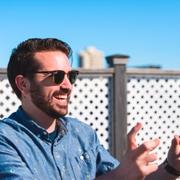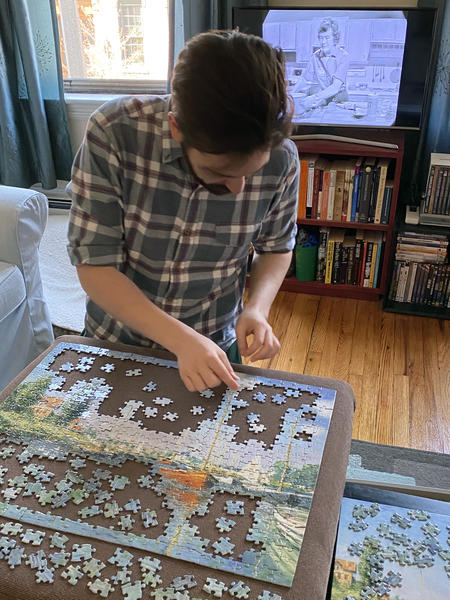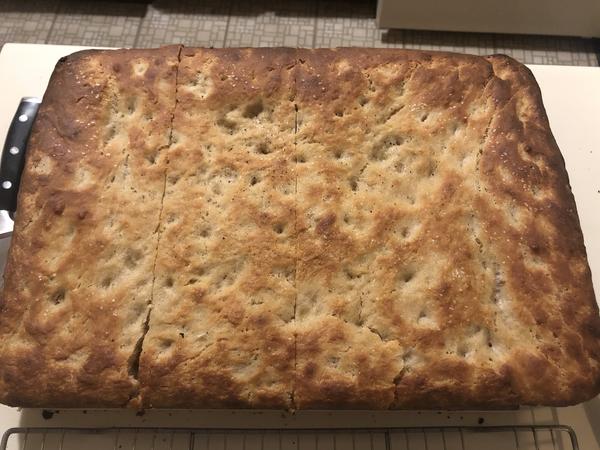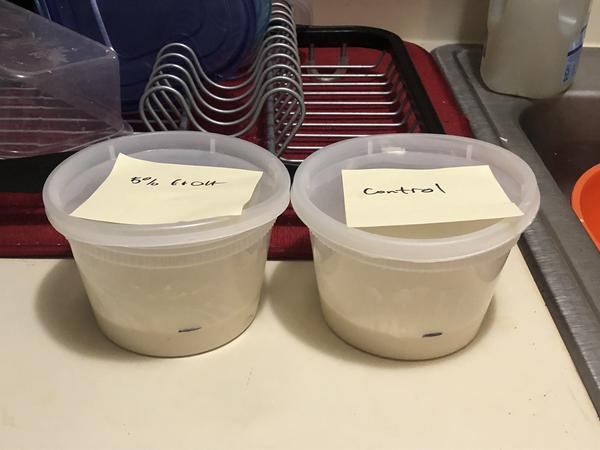
Matt Volpe, a fourth year graduate student in the Balskus lab, shares his quarantine bakes, stress relievers, and concerns for life post-COVID-19
CCB: Hello! Where are you right now?
MATT: I'm in Cambridge in my apartment. I live by myself in a studio. I really liked not having roommates for a long time and just recently I started feeling like, "Oh, you know, maybe having a roommate would be nice."

|
During the COVID-19 shutdown, Matt works on a puzzle while Julia Child works her magic in the background. Photo courtesty of Matt Volpe |
CCB: How are you spending your days? Can you do any kind of research?
MATT: Because I'm a fourth-year grad student, we have an independent proposal that we have to write. I'm working on that right now because it's just research online and writing. Although I will admit, staying focused can be a little bit of a challenge when you're stressed out by everything on the news. But, making progress.
CCB: What do you do when you get stressed out?
MATT: I'm doing yoga in my apartment to try to stay healthy and relax a little bit. Take some walks, get some fresh air and some vitamin D while remaining socially distant from people. And, my boyfriend is around—he lives in Southie, but I've seen him a couple of times. He has a car, so he can avoid public transit. He's my human contact.
CCB: When you’re not managing stress, what are you up to?
MATT: It's mostly the proposal. A lot of people are doing bioinformatics projects—looking at big data sets of genomes and metagenomes because we work a lot on the microbiome in the Balskus lab. Some administrative stuff with the lab—we're looking for some new electronic notebook software. It's super weird to not be able to go into the lab. For all the complaining I've done in the past about how frustrating lab work can be in certain moments, when someone tells you you're not allowed to do it anymore…. Absence certainly makes the heart grow fonder.
CCB: What else do you miss about campus?
MATT: I really miss my desk in lab. Something about the physical being in lab makes me a lot more focused. I've figured out how to work from home at this point, but it's weird when I'm in a small apartment and my bed is right here and my couch is right here and my snacks are over there. It's difficult to stay engaged for a whole nine hours at a time.
I really miss seeing my co-workers for sure. We have daily coffee chats that one of the postdocs in our lab, Monica, started. Every day around 3 p.m., we log in to Zoom and just have coffee and chat. Another postdoc in the lab, Grace, has been doing little classes on bioinformatics. Another postdoc, Nate, has been doing this little course on using Adobe Illustrator. Everyone's trying to share something they do to help out.”
CCB: How else are you staying in touch with people? Do you stay in touch with family?
MATT: We're trying. My family has a very active group chat. We've actually started doing these family happy hours on the weekend with my dad's extended family—my aunts, uncles, my grandma, several of my cousins—we all pick a time, and I'll have a drink and a snack. My grandma is much better at Zoom than I thought she would be. I'm very impressed.
My parents and my siblings—most of them live in Chicago. My brother, his fiancé, and my sister have all been at home with my parents. I video-chatted in for dinner one night—my sister put her phone on the table and pointed me at mom and dad. It was nice. A little weird. I think that's kind of the theme now—everything's a little weird, but we make it work. I'm a little jealous that they get to hang out with the dogs in the backyard.
One other thing I'm excited about is a friend of mine who I liked to play board games with introduced me to this thing on Steam where you can play board games on a virtual table top together remotely. It's called table top simulator.
CCB: I've heard you're a baker... are you baking anything right now?
MATT: Trying to, occasionally. There was a social media craze around starting a sourdough starter right when all the quarantine started. And I had actually had a sourdough starter for a while. I tried doing it now—honestly, that thing eats up way too much flour. You gotta conserve resources. So, the sourdough starter did not work out so well. It's stuck in the freezer.
Have you heard of "Salt, Fat, Acid, Heat?”
CCB: Yeah!
MATT: I made Samin Nosrat's focaccia several times now. I'm very happy about that.
|
|
CCB: The sourdough starter seems appropriate given your research.
MATT: We actually have a lab Slack workspace—you can make different channels in there, and one of them is called "The Fermentation Channel." There's a couple sourdough starters and one of our graduate students, Vayu, is super into cooking and fermentation. Super cool. I've tried experimenting with my sourdough starter and adding a small amount of alcohol to it because yeast naturally produce alcohol as they ferment. I wanted to see how that would change it. The results were inconclusive, but it was a fun project. It was fun to do something with my hands that feels like science.
CCB: I also heard you’re an actor—impressive! Are you doing anything related to theater?
MATT: I've been trying to learn to play piano. I played a little bit in the past because I did theater in college and I sing, but I've never been very good at it. I have a keyboard that a friend gave me—I had it under my bed for a few months, so now I pulled it out and set it up in place of my kitchen table. I plunk away a little bit. I'm getting better. I wouldn't say I can play yet, but there's progress.”
CCB: Is there anything you're binge watching?
MATT: Ooh. I went through all of "Better Call Saul." The writing is just fantastic. I originally got into "Breaking Bad" because I was like, "Ooh, chemistry!" But ultimately, it was the writing of the show that I liked.
My lab mates were incessant about getting me to watch "Tiger King." So, I'm almost done with that, and I kind of hate myself for loving it, but I love it. Have you watched it?
CCB: I held out for a long time but... of course.
MATT: I've been doing some audio books—I've been reading "The Expanse," which is that one they made into a series. It's very good. I think I might watch "Westworld" next.
CCB: What about music? Or podcasts? What else are you listening to?
MATT: There are a couple politics podcasts I like—all the stuff that Crooked Media makes, so like "Pod Save America" and "Lovett or Leave It" is a funny one. Always love the fun weekend NPR shows like "Wait Wait... Don't Tell Me!" and things like that. It's so funny to listen to these podcasts that are usually done in front of big studio audiences, and everyone's doing them from their home. They're interviewing their guests on Zoom...
"It's OK to be a little stressed and worried and distracted. It's OK if you're not operating at 110 percent. We're all human." |
CCB: That leads me to my next question: To you, what is the most obvious, visible sign of local change?
MATT: So, I live pretty close to the Cambridge Public Library that has that big park right in front of it. And, this wasn't true at the beginning of the quarantine period, which made me a little nervous, but now when you walk by it's pretty empty even on a gorgeous day. There is something that's a little bit weird and unsettling about seeing that. When you know there should be a ton of kids and dogs running around. There's certainly an eerie-ness to that.
That, and the couple times I've driven around with my boyfriend—you can see the highways are pretty empty, which is definitely unsettling.
CCB: Switching gears—no pun intended—I heard you're planning a talk about COVID-19 therapeutics.
MATT: Yeah! So this is a cool series of talks that the Graduate Student Union organized, which is another thing I've been channeling my energy into. They've started doing a bunch of things to support not only grad students but the community as a whole—they organized a mutual aid program where undergrads needed rides to the airport and older people needed groceries delivered. They found graduate students to help do those things and fill in.
The other thing they wanted to do is celebrate the breadth of everything we do at Harvard and how we all view and respond to the crisis. So, they organized a series of talks called "The COVID Night School." The first one was this past Wednesday; an MD/PhD from the immunology program talked about the crisis as a whole. Someone from the History of Science Department is talking next week about a historical perspective of the plague in Europe, which I think is going to be really cool. And then, I'm actually giving a talk in two weeks. Because I do a lot of biochemistry, it'll be on how antiviral drugs actually work, why we think remdesivir might actually stop the virus, and what hydrochloroquine might be doing (if it's doing anything at all)—trying to make the chemistry of how the drugs work a little more accessible to people.
[Quick aside to say, COVID Night School is open to the public! Register here.]
CCB: So, everyone is a little on edge—staff, graduate students, leadership. What are your major concerns for the next year and what are you doing to mitigate those fears?
MATT: We [the Union] have been working closely with the Graduate Student Council, which is the Harvard student government organization, on a few different things. They released a letter about getting all of the grading for graduate students for the spring semester changed to mandatory satisfactory/unsatisfactory, so people don't have to worry about accessibility issues or stress and other things during the pandemic interfering with academic progress. We were really glad the administration was really responsive to that. A lot of students have been meeting with different department chairs and deans to try to talk about what graduate students need right now and the best way to respond to that. There's a letter that over a thousand graduate students have signed about bridge year funding—this is more of an issue for students in social sciences and humanities where their funding is more dependent on having teaching positions or where their funding source changes from year to year. Fortunately, a lot of lab scientists are supported by multi-year grants, so we're in a more solid position.
The other elephant in the room is that we're still trying to negotiate a contract. Obviously, the context for that has changed a lot. We're re-evaluating and figuring out what path makes the most sense. Their [the bargaining committee's] next meeting with the administration is in the beginning of May, and they'll still be talking about how they can best protect graduate students during this time.
CCB: Are you hopeful?
MATT: I am. We have 15 or 20 different tentative agreements that have already been signed and are agreed to. And a lot of those things that less directly impact the economic concerns that people are facing but things about international students' rights, workload protections, things like that that are really valuable, substantive improvements. That already makes me optimistic. I'm confident that we'll be able to get an agreement that at least brings some sort of stability and certainly for our pretty vulnerable population in the Harvard community.
CCB: What pandemic advice have you come across that worked well for you?
MATT: I was driving myself a little crazy when this first started about, you know, there's all this stuff I should be getting done and I should be using this time to be so productive and do all of this writing. It's OK to be a little stressed and worried and distracted. It's OK if you're not operating at 110 percent. We're all human. Find the rhythm that works and stay in touch with people and don't be afraid to reach out. I've had times when I've ended up calling someone, but we end up on a Zoom call for an hour while I'm just working on something else. We're not even talking but just having another person present helps. It's OK to reach out to people and say, "Hey, I just need to feel like there's someone there." I think people are getting more comfortable with that, and that's helping.
Emotional energy is finite.
CCB: Anything else you'd like to add?
MATT: I think the new department Slack is interesting and exciting. I'm curious to see how it goes. I'm glad people are finding these new ways to connect to each other. I think that's a really good thing.
 Matt has made Samin Nosrat's focaccia recipe multiple times during the COVID-19 shutdown.
Matt has made Samin Nosrat's focaccia recipe multiple times during the COVID-19 shutdown.

